WashingtonBoating
Laws & Regulations
Who needs to take the Washington boaters safety course?
All boaters must have a Washington State Boater Education Card to operate a motorized watercraft of 15 HP or more. BOATERexam.com® is a delegated provider for the Washington State Parks.
Returning user? Log in here
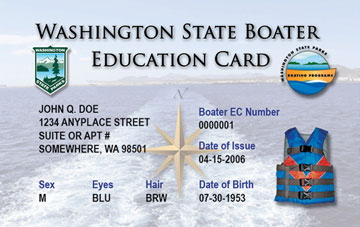
Approved by the
Washington State Parks

Good for life!
Get your official
Washington Boating Card
Washington Boating Safety Requirements
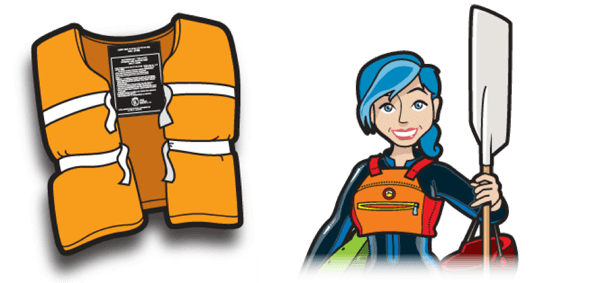
Personal Flotation Devices (PFDs aka Life Jackets)
Washington State requires at least one U.S. Coast Guard approved Type IV PFD (ring buoy OR seat cushion) on all recreational boats in excess of 16 feet in length, in ADDITION to the wearable PFD required for each person onboard.
Exceptions to the requirement for carrying a Type IV PFD include the following:
- Personal Watercraft
- Canoes and kayaks
Note
All persons being towed behind a vessel are considered to be onboard.
All PWC occupants must be wearing their PFD while underway.
Child PFD Law
All boaters or passengers 12 years of age and under must be wearing a PFD while onboard a vessel that is less than 19 feet in length while underway.
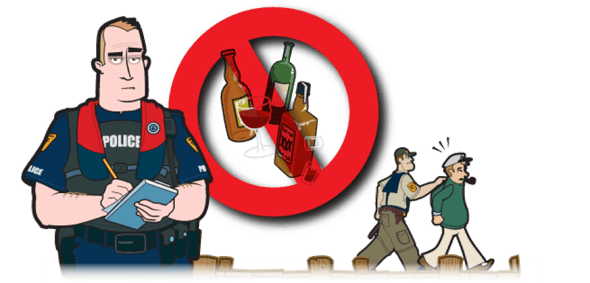
Alcohol & Boating Under the Influence (BUI)
Boaters need to be aware that it is illegal to drink and operate a boat just as it is to drink and drive a motor vehicle. Most of the laws pertaining to the operation of a vessel under the influence of drugs and alcohol apply in the same way as they would for a car, truck or motorcycle on the road.
It shall be a violation for a person to operate a vessel while under the influence of intoxicating liquor or any drug.
A person is considered to be under the influence of intoxicating liquor or drug if:
- The person has 0.08 grams or more of alcohol per two hundred ten liters of breath, as shown by analysis of the person's breath
- The person has 0.08% or more by weight of alcohol in the their blood as shown by analysis of their blood
- The person is deemed to be under the influence of or affected by intoxicating liquor or any drug.
The penalties for boating under the influence of intoxicating alcohol or drugs include the following:
If convicted of an offense:
- Imprisonment in a county jail for up to 90 days
- Fines of up to $1,000
The operator may also be subject to the payment of compensation for any damages or injuries which may have occurred as a result of the offense.
- Homicide by watercraft - When an individual involved in a boating accident dies as a result of injuries incurred during that accident within three years following the accident the operator of the vessel implicated may be charged with homicide by watercraft if:
- They were found to be under the influence of either alcohol or drugs (or any combination of the two)
- They are determined to have acted in a reckless manner which resulted in the accident
- Assault by Watercraft - When an individual involved in a boating accident experiences serious bodily injury such as risk of death, permanent disfigurement, or loss of function of a part of the body or organ the operator of the vessel implicated may be charged with assault by watercraft if:
- They were found to be under the influence of either alcohol or drugs (or any combination of the two)
- They are determined to have acted in a reckless manner which resulted in the accident
Boaters are required to respond to any law enforcement officer's request to stop his or her boat when asked to do so by said officer. It is illegal to elude law enforcement officers.
Any new or used motor driven boat or vessel, other than open motorboats with outboard engines and personal watercraft, sold within Washington State must display a carbon monoxide warning sticker on the interior of the vessel.

Washington Boat Registration
The Washington State Parks is responsible for regulating the state boating laws of Washington State.
All vessels propelled by machinery, including gasoline, diesel and electric motors, and principally operated on Washington State waters must be registered and issued a Washington Registration Card and Number by the state, which can be obtained through the office of vehicle licensing or Auditor in the boat owner's county.
Exceptions for the boat registration requirements include:
- Non-motorized vessels including sailboats under 16 feet in length.
- Vessels currently registered in another state or country using Washington waters for up to 60 consecutive days.
- Vessels measuring less than 16 feet in length propelled by a motor that is no greater than 10 horsepower operated exclusively on non-federal waters.
Note: By law, any new or used motor vessel, other than a Jet Ski type personal watercraft, must display a sticker that warns passengers of the dangers of carbon monoxide (CO) poisoning.
Note: Sticker should be provided when you renew or register, or by the boat manufacturer or previous owners. If they do not receive one, you may contact your local vehicle licensing office.
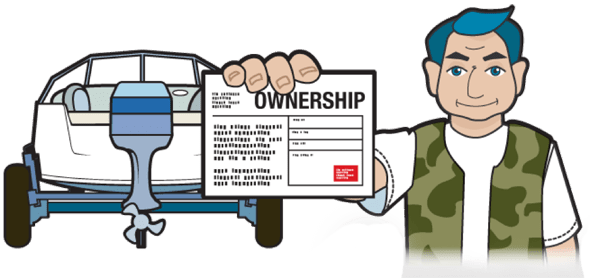
Certificate of Number
Boat owners must have at least a temporary Registration card before they can operate in state waters. Upon receipt of the Registration Card please note the following:
- It must be signed and carried onboard when operating the vessel.
- The Department of Licensing must be notified within 15 days if the boater changes residences.
- The Department of Licensing must also be notified within 15 days if the vessel is either destroyed, lost, stolen or abandoned.
- The Department of Licensing must also be notified within 15 days for a lost registration card.
- The Washington registration period is from July 1 through June 30 each year.
- Washington registration and decals are valid for 1 year.
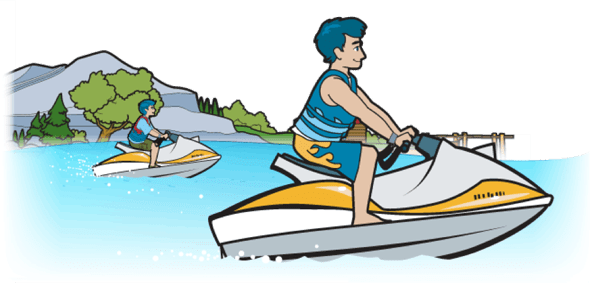
Personal Watercraft Laws & Regulations
In addition to the laws that apply to all vessels, there are additional laws that apply specifically to personal watercraft.
Do not underestimate PWCs – they are very powerful for their small size and demand the same respect as any boat. In fact, PWC operation must adhere to the same rules and regulations as any other powerboat – including registration with the state and a B-1 class fire extinguisher aboard.
PWCs have some additional requirements:
- The operator as well as all passengers on a PWC must be wearing an inherently buoyant U.S. Coast Guard approved Type I, II, or III PFD.
- When towing someone on a tube or on water skis, there must be capacity on the PWC to accommodate the operator, the observer as well as the tuber/skier(s).
- PWCs must stay at a distance of 200ft from other water skiers or others being towed behind a vessel.
- PWCs must operate at slow-no wake speed, maximum 5 mph limit when:
- Within 200ft of a swimmer, surfer, diving flag, bank or wading angler, dock, swim float, boat launch, ramp, pier, marina, floating home, moorage area, or boathouse;
- Within 100ft of any anchored or non-motorized vessel; or
- Within 200ft of shoreline on all lakes, reservoirs, and bays.
- PWC operators in Washington State must not exceed 10mph when approaching within 100ft of a motorized or sailing vessel that is underway.
- A person shall not operate a PWC in a reckless manner including weaving through congested traffic, recklessly jumping the wake of another boat unreasonably or unnecessarily close to the boat, or when visibility around the boat is obstructed. A person shall not recklessly swerve at the last possible moment to avoid a collision i.e. ‘spraying’ another boater.
- A person shall not lease, hire or rent a personal watercraft to a person under the age of sixteen.
Hours of Operation
Personal watercraft may not be operated during hours of darkness (sunset to sunrise).
All those operating a PWC in Washington,
must be at least 14 years of age.